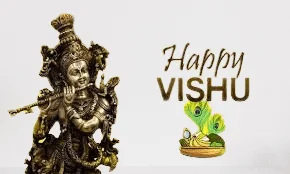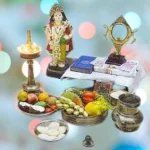Vishu Festival is celebrated on the first day of Medam or the Malayalam month or between the months of April and May of the Gregorian calendar. It symbolizes the beginning of the spring season. Vishu festival is a Hindu festival and is celebrated in Kerala as the harvest festival and the astrological New Year of the Malayalis. Vishu indicates the movement of the sun to Aries or the Mesha Rashi and marks the day from which the farmers begin the ploughing of land and other agricultural activities.
Vishu Festival
Vishu marks the beginning of the New Year for the people of Kerala. Hence Vishu festival is called as the Malayali New Year. This year it will be celebrated on 15th April’2023. In 2022, Vishu festival was celebrated on 14th April’2022.
Vishu : Significance
In Sanskrit Vishu means equal, which implies the day with equal number hours of day and night or the equinox. The day of Mesha Sankranti or Mesha Sankramam, Vishu festival is a family festival. It is a period dedicated to Lord Vishnu and is celebrated by worshipping Lord Vishnu and Lord Krishna. VishuKani, VishuKaineettam and Vishubhalam are the three most important aspects of the this celebrations.

Several mythological tales are related to the celebration of Vishu festival; and as per one such story it is the day when Lord Krishna killed Narakasura a demon. As per another belief it is celebrated as the return of Surya Dev. According to the other folklores Ravana demon king, never allowed Surya Dev or the Sun God to rise from the east. It was on this day, after the death of Ravana, the sun or Surya Dev started to rise from the east. Since then, Vishu is celebrated with great zeal.
Vishu Kani
As per the religious faith of the people on the previous night of the Vishu festival a VishuKani is prepared in the prayer room or worship area of the house before the idol of Lord Vishnu and Lord Krishna by the eldest lady of the house. VishuKani is regarded as the symbol of good luck and prosperity by all Hindu Malayalis. In Malayalam Kani means “which is viewed first ”therefore, the term ‘VishuKani’ means the first thing to be seen at dawn or the early hours of the day. The devotees believe this would bring them prosperity throughout the New Year.

The VishuKani consists of a sacred ceremonial preparation of all auspicious goods considered to be the omen of good luck and prosperity. These goods include coconut, betel leaves, Arecanut, yellow Kani Konna flower, Kanmashi kajal, raw rice, lemon, golden cucumber, jack fruit, a metallic mirror, a holy book, cotton dhoti and coins or currency notes. All these articles are collected in a bell shaped vessel made of metal which in Malayalam is called “Uruli”. A traditional bell shaped metal lamp called “Nilavilakku” is also lighted and placed together with the Vishu Kani before the deity.
On this day, as per the traditional belief of the people all the members of the family have to wake up early in the morning by dawn with closed eyes go to the worship area of the house, to get the first sight of the Vishu Kani because it would bring them good luck throughout the year. Therefore, the VishuKani is arranged with great care and precision to create a positive picture.
After seeing the VishuKani, people recite verses from Ramayana, the Holy book of the Hindus, which is considered to be a sacred act. Malayalis believe that the first page of the Ramayana which is opened by the devotee has a significant impact on his/her life in the upcoming year. After this the children and adult burst crackers and this continues from morning to night. Known as “Vishu Paddakam” or the bursting of crackers is an integral part of the Vishu celebration enjoyed by all big and small ( The word ‘Padakkam’ in Malayalam means firecrackers. Firecrackers are burst during Vishu the same way north Indians burst firecrackers during Diwali. ). This is followed by a traditional feast known as “Vishu Sadhya”.
Vishu Sadhya
The Sadhya (feast) is a major part of all Kerala festivals. Most of the malayalis eat fish, chicken and beef with vishu sadya. However, special dishes called Vishu Kanji, Thoran and Vishu katta are also made. The Kanji is made of rice, coconut milk and spices. Vishu katta is a delicacy prepared from freshly harvested rice powder and coconut milk served with jaggery. For Thoran, the side dish, there are also mandatory ingredients. Other important Vishu delicacies include Veppampoorasam (a bitter preparation of neem) and Mampazhappulissery ( a sour or ripe mango soup ) Even temple offerings called bewu bella, include a mix of sweet jaggery, bitter neem, and other flavors.
The mixing of sweet, salty, sour, bitter and astringent flavors for the new year Vishu meal is similar to the pacchadi food prepared on new year day such as Ugadi by Hindus in Karnataka, Telangana and Andhra Pradesh in the Indian subcontinent. These traditional festive recipes, that combine different flavors, are a symbolic reminder that one must expect all flavors of experiences in the coming new year, that no event or episode is wholly sweet or bitter, experiences are transitory and ephemeral, and to make the most from them.
Vishukkaineetam
After performing one of the first rituals of Vishu festival, Vishukkani, all of the family members takes bath and wear new clothes to collect Vishukkaineetam. This is a practice of distributing wealth in form of coins. The elders of the family give away coins or notes to the younger ones.
Some of the wealthy families will not give money to their children but also to their neighbours, servants etc. People carry out this custom in this belief that this way their children would be blessed with prosperity in the future.
Vishu Dishes
Special dishes are prepared using jackfruits, mangoes, pumpkins and gourd besides other seasonal vegetables and fruits. The food items consist of roughly equal proportions of sweet, salty, sour and bitter items. Popular feast dishes include ‘Veppampoorasam’ (a bitter preparation of neem), Kanji (drink made of rice, spices and coconut milk) and ‘Mampazhapachadi’ (a sour mango soup).
In small villages, men and women dress up wearing a skirt of dried banana leaves and masks on face. Then they move from house to house and collect rewards for their performance. Konna (Cassia fistula), commonly known as golden shower is the flower of the Vishu festival. The tradition of buying of new clothes for this occasion is called Puthukodi or Vishukodi.

Pathamudayam is celebrated on the 10th day of Medam Month in Malayalam Era and 10th day after Vishu. According to the tradition, ‘Pathamudayam’ is the day when the sun is most powerful and astrological science support the believe. To symbolize the ten sunrises from Vishu, traditional oil lamps with 10 wicks are lit in every house.
In Tamil Nadu, the people celebrate this day as New Year Day which is called as Puthandu by the people of Tamil Nadu. This day Celebrated as the Tamil New Year Day, holds a lot of importance and significance. This year in 2023, Puthandu will be celebrated on April 14. In 2024.
Vishu has integrated every thing during this period. There is a migratory bird which normally visits Kerala during this time and is referred to as Vishu Pakshi (Pakshi means bird). Vishu has immense significance astrologically as the day and night are of equal duration. Major periodicals in Malayalam carry Vishubhalam (astrological predictions) for the next one year. Preparations for the agricultural season also begin on the Vishu day.
Thanks for visiting read4knowledge.